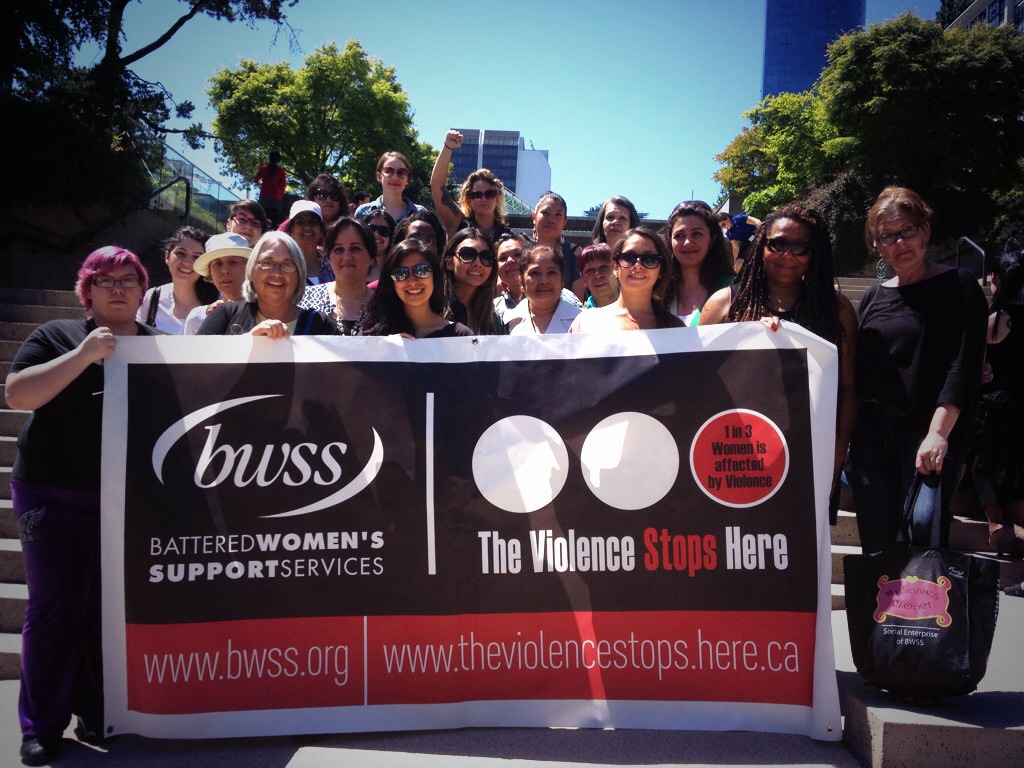
On November 25th the International Day for the Elimination of Violence against Women, BWSS hosts Breaking the Silos.
Breaking the Silos will invite our community to join with women around the world to mobilize and show our resistance to environmental and social degradation.
It is a chance to uplift our voices about the climate impacts our communities are facing and demonstrate the many real climate solutions that are just and effective.
Breaking the Silos is held in advance of the Paris Climate Conference is officially known as the 21st Conference of the Parties (COP21) to the United Nations Framework Convention on Climate Change (UNFCCC), the United Nations body which is responsible for climate and based in Bonn, Germany. The Conference will also serve as the 11th Meeting of the Parties to the Kyoto Protocol (CMP11). The COP meets each year to take decisions that further the implementation of the UNFCCC and to combat climate change. COP21 will take place at the same time as CMP11, which oversees the implementation of the Kyoto Protocol and the decisions made to increase its effectiveness. This year COP21 will be held in Paris, France on November 30th.
We understand that climate change is not gender-neutral.
There are social and cultural stratifications in our society so women and men are affected differently by the negative impacts of climate change. Wherever women have acted against resource extraction, ecological destruction, threat of atomic annihilation they become aware of the connection between patriarchal violence against women, other people and the earth. For women, there is no separation between production and reproduction, land and life, resistance and survival. The big challenge for COP21 will be to systematically incorporate gender equality and women’s empowerment into our operational responses to climate change at the local, national, and international levels. This will require a paradigm shift that puts women at the centre of our adaptation, mitigation, and disaster risk-management efforts.
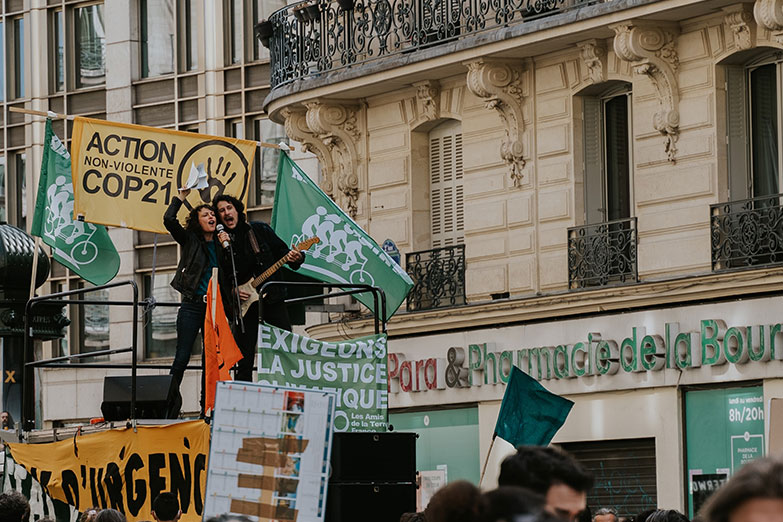
Patriarchal systems of capitalism and colonialism don’t recognize or value inherent worth in women’s bodies and the work women do, and instead commodify them.
Once women’s bodies are objectified in this way, it positions violence against women as justified, embedding it into the fabric of society. Violence against women is and remains the bedrock for all other kinds of violence.
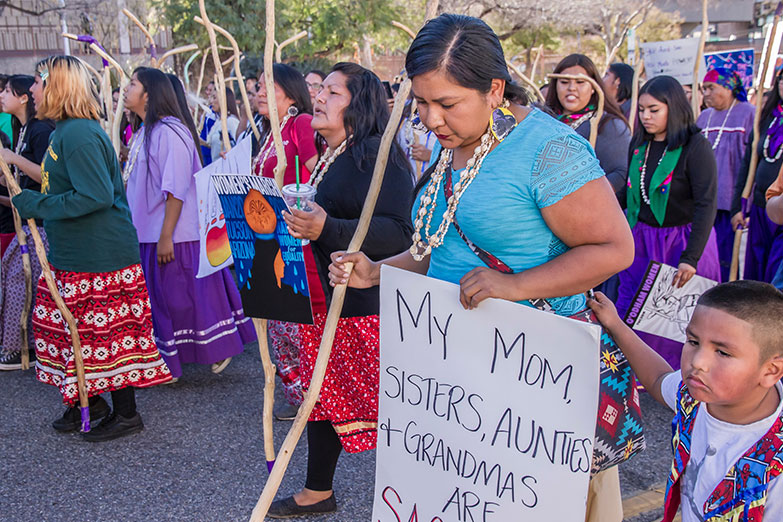
The impacts of resource extraction operations are not gender neutral.
Women can experience the direct and indirect consequences of mining operations in different, and often more pronounced, ways than men. Within resource extraction, the primary benefit forwarded by industry is jobs, which are disproportionately held by men. Women are hired by mining companies but a gender division of labour often occurs where women are relegated to ‘traditional female’ occupations, such as kitchen work, housekeeping, cleaning or laundry and are paid much less, comparatively.
Women bear the brunt of many of the negative impacts felt at home: water resources drained and poisoned, women’s capacity to provide food and clean water for their families is undermined, and subsequently lead to an increase in their workload such as having to walk greater distances to access water, fuel/wood, forest products and land to plant food crops, mine blasting creates cracks through people’s homes, increased domestic violence, alcoholism and other licit and illicit substance abuse. It has been suggested that having women around diffuses “industrial tensions” through sexual distraction and sexual relations.
This gender stereotyping can then spill over into the community. While mining culture is not responsible for creating a particular form of male culture in regard to women and while there are very many other factors adding to a patriarchal and patronizing way of regarding women, the connections between physical and sexual violence against women and the exploitation of land aren’t random.
In the northeastern B.C. boomtown, of Fort St John, the average income for men in 2006 was $56,000 – $12,000 more than the national average – due largely to new jobs in construction, oil and gas, transportation and communication and mining.
By contrast, the average income for women in Fort St. John that year was just $27,000.
This income disparity results in women becoming financially dependent on their male partners. Economic dependence is a risk factor for relationship violence. Due to the decline of traditional mechanisms of social control and the influx of a transient male workforce, social and health problems can become more prevalent in communities. These problems can include increased alcohol use, domestic violence, sexual violence, sexually transmitted infections and HIV and AIDS, and sexual exploitation of girls and women.
In a lot of countries Indigenous women are on the frontline of exploitation because the exploitation and rape of land is profoundly and deeply connected with the exploitation and rape of Indigenous girls and women. In Canada, there are over 1,200 reported cases of missing and murdered Indigenous girls and women and in Mexico, six women a day are killed many of whom are Indigenous.
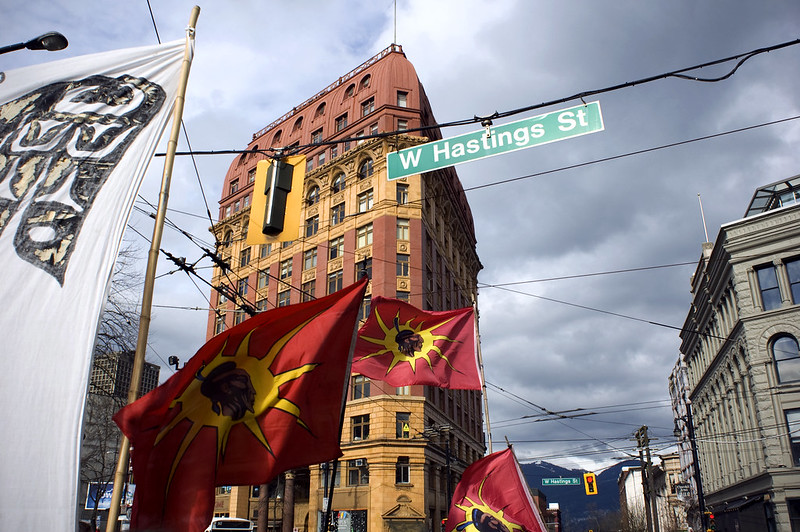
We rely on the land. Our stories and songs are on the land. Our identity is from the land. I can’t think of how this dislocation from the land will affect my daughter. The company never asked how this is going to affect my daughter and my granddaughter. – Anne Marie Sam, a member of Nak’azdli First Nation
More than 80 per cent of all lands utilized or occupied by Indigenous peoples lack legal protection, and are highly vulnerable to being seized by private companies, individuals, and governments themselves, in a non-stop drive toward carbon-intensive investments in agriculture, logging, mining, oil and gas, dams and roads, and tourism.
“The same development that fuels climate change, continues to rob Indigenous peoples of their human rights,” Victoria Tauli-Corpuz, UN Special Rapporteur on the Rights of Indigenous Peoples, said, stressing the need to protect those right and the traditional knowledge that has kept ecosystems healthy.
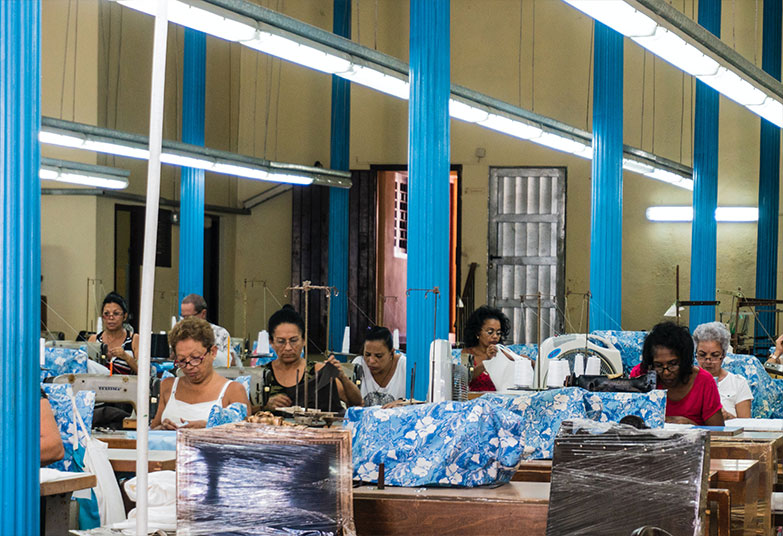
The Fashion Industry is Implicated
The facts and figures are in and including the relevant segments of agriculture and manufacturing, 1 in 6 humans on Earth are somehow involved in the global fashion industry.
In the mid-1960s, 95 percent of Canadians’ clothes were made domestically; today, 97 percent are made abroad. Eighty million pieces of clothing are sold annually. And an especially disconcerting one: Fashion—a $2.5 trillion sector—is the second most polluting industry on Earth, right behind oil. Manufacturing a piece of clothing has a tremendous impact on the environment—for example, beyond the carbon emissions caused by energy consumption, the typical pair of jeans eats up 1,664 gallons of water in its lifetime. Regardless of this ecological toll, the average Canadian still throws 70 pounds of clothing and textiles into the trash every year.
We’re disconnected from the people who make our clothing as 97% of items are now made overseas. There are roughly 40 million garment workers in the world today; many of whom do not share the same rights or protections that many people in the West do. They are some of the lowest paid workers in the world and roughly 85% of all garment workers are women. The human factor of the garment industry is too big to ignore; as we consistently see the exploitation of cheap labor and the violation of workers’, women’s, and human rights through globalization and as direct result of unchecked consumerism.
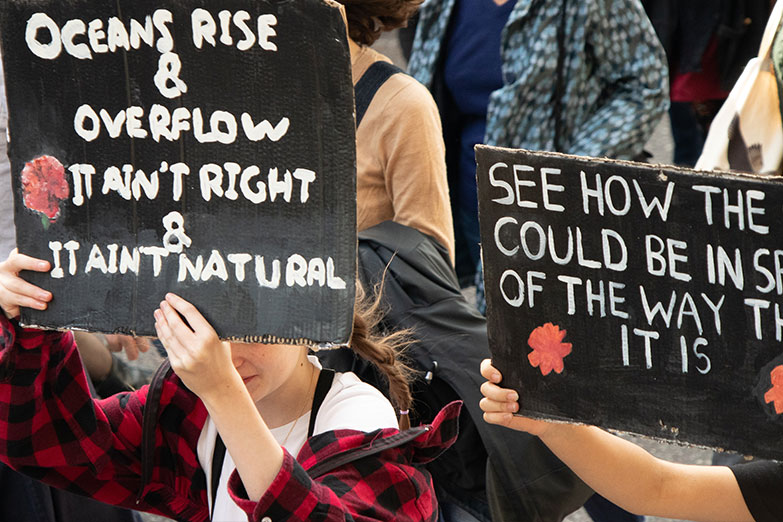
Climate Change
It is established that climate change presents a clear and present threat to the lives of many persons and communities around the world.
It is evident the increase CO2, the warming planet and erratic weather behaviour threatens the systems of life. omen in the global south, in particular are vulnerable to these changes and as such there is a need to differentiate and examine the roles in depth.
“She walks for hours to fetch water and toils in drought-prone fields to feed her family…
She left her country with the promise of a good job only to find herself forced into sex work…
She picks up the pieces after a cyclone destroys her makeshift home and small business…
She is the provider, farmer, teacher, doctor, entrepreneur, minister, leader, mother — contributing every day to her household, society and the economy. Women and girls make up more than half the world’s population — and they are on the frontlines — often more deeply impacted than men and boys by poverty, climate change, food insecurity, lack of healthcare, and global economic crises. Their contributions and leadership are central to finding a solution.” ~ UN Women
Canada can play an important role in reducing greenhouse gases at home and helping others around the world do likewise. U.S. President Barack Obama’s decision to reject the Keystone XL tar-sands pipeline reinforces the fact that we can’t continue burning fossil fuels at current rates. The province of Alberta released a climate change report on Sunday that includes plans for an economy-wide carbon tax, the phasing out of coal-fired power generation in the province by 2030, and a greenhouse gas emissions cap. Reaction to the plan, which went to a meeting of first ministers in Ottawa on Monday, was largely positive from tar-sands producers, environmental groups and politicians both inside and outside of Alberta. Canada’s newly elected prime minister and other leaders from across Canada are headed to Paris at the end of the month to plan the next phase of global climate action at COP21. Millions of people from across Canada and around the world will be marching and speaking out, demanding their leaders unite to protect the planet. Though Canada has yet to articulate a plan in advance of COP21, we remain hopeful.
Breaking the Silos
Battered Women’s Support Services (BWSS) is honouring International Day for the Elimination of Violence against Women, November 25, 2015 by presenting a unique and memorable event hosted by Global BC’s Jill Krop. Breaking the Silos reminds us of the undeniable connections between climate change and gender-based violence and we are delighted to present Severn Cullis-Suzuki as the keynote speaker:
“Each one of us comes from a woman. And ultimately, all of us, come from the Earth. Ancient truths, yet today we deny them. This denial allows extremist resource extraction, and where extreme extraction occurs, violence against women is rampant. Now the 6th Mass Extinction event is unfolding – a war on life itself, and a war on life givers. I am honoured to be invited to speak at the gala, and looking forward to talking about the fundamental connections between violence against the Earth and violence against women.” Severn Cullis-Suzuki
The evening will also include:
- Updates from our legal advocacy program which provides support, advocacy, information and accompaniment to women who have experienced violence and who are involved in the legal system.
- Live performance by local hip-hop artists, Claire Mortifee and Young Nige with DJ K-Rec of Compassion in a Kiss. A collaboration BWSS is thrilled to be a part, Compassion in a Kiss amplifies the voices of women and speaks to sexual violence and urges men to take a proactive role in sexual violence prevention.
- Featured performance by Wildflower, Women of Turtle Island drum group
- Breaking the Stereotypes eco-fashion show by My Sister’s Closet, showing that you can buy local and social all while being fashion forward!

http://www.un.org/sustainabledevelopment/cop21/
www.cbc.ca/news/business/paris-climate-conference-canada-provinces-1.3301615
http://wecaninternational.org/declaration#.VlOA50YuzDG
http://www.wloe.org/what-is-ecofeminism.76.0.html
http://globalnews.ca/news/2355369/reaction-to-albertas-ambitious-climate-change-plan/
http://www.unwomen.org/en/news/stories/2015/11/andrea-a-jacobs-q-and-a#sthash.0eoUWr8N.dpuf




